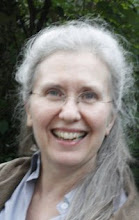They work so hard, she says.

Wherever you look, it takes time for your eyes to adjust--to figure out what is happening.

But no one seems angry. Maybe they have no energy for it.
Maybe they hold it in until they get home.
Maybe they do not want strangers to know what they are feeling. Or to risk losing their jobs.
Maybe they think, What's the use? It is God's will.

Old and young, with shoes or without, everyone works.

A subcontractor brings heavy blocks of stone . . .

to build a jersey barrier by hand, no matter how long it takes.

They are determined to make their roads safe--even though they, themselves, are not safe doing it. No flaggers to slow the traffic whizzing by on both sides.

They build jersey barriers more beautiful than ours.

How long will it take to haul all these mounds of garbage on tricycles?

How many expertly woven garlands, how many perfect stacks of fruit will it take to overwhelm the poisonous stink of pollution?

How can he feed his family by repairing shoes in a land where so many don't wear them?

How does she find water to wash all those clothes?
Is she too tired to think of lifting the basin up on a stool for the sake of her spine?

Where can they find a place to make their homes?

How many squatters can live in abandoned public housing

. . . beside the stench of open sewers?

Look! Maud says.

They are building a luxury hotel by hand.

Can you believe it?

Scores of workers seem to know what they're doing, pulling order out of chaos.

All ages eagerly join the cement line to build the hotel.

There is not men's work, or women's work here, though women are paid much less than men. But everyone needs a job.

So labor is cheap. And the shareholders demand their profits.
Did you read Mohan's book? Maud asks. The one where North Americans write their comments after hip surgery? They are thrilled to finally be able to resume their hiking, biking, skiing, squash, tennis, golf, swimming, dance, yoga and taekwondo.

Before they do that, they should westle with their conscience, Maud says, barely containing her own anger.
They write in Mohan's book: Keep the price down!
Can you believe it?!
It makes me want to give back my ticket to America, she says. (Her ancestors came on the Mayflower nearly 400 years ago.)
Do these Americans see how hard hospital staff work to serve them, how many hours? Do they see these tiny nurses hoist big American bodies without even back braces to protect them? With only the flimsiest canvas shoes?

Keep the price down!? Can you imagine?!

Do Americans see anything at all, but our own advantage?

"Do you think it was wrong for us to come?" I ask Maud.
No, she says. If our $7,000 helps them serve the people who need it most, that's a good thing.
If our money helps make it possible for Dr. Bose to go to government hospitals and operate on those too poor to come here, then more Americans should come.
It's a good thing, she decides, wiping tears from her cheek, biting her upper lip.
"Are you ready to go now?" I ask.
Where?
"To the villages where the tsunami struck two years ago."
Yes, she says, turning from the window. I'm ready.
